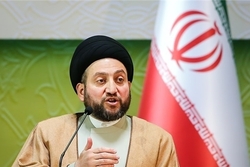 Head of the National Wisdom Movement of Iraq Ammar Hakim condemned the new US sanctions imposed against Iran, and described them as "brutal and a threat to regional security".
Head of the National Wisdom Movement of Iraq Ammar Hakim condemned the new US sanctions imposed against Iran, and described them as "brutal and a threat to regional security". RNA - "The anti-Iran sanctions are brutal and a danger to the security of the region," Hakim wrote in a statement on Tuesday.
The Iraqi politician, meantime, said that the US sanctions, including the implementation of a new part of economic sanctions, will be of no use.
Hakim urged all signatories of the nuclear deal and all other international agreements to abide by their commitments, and said, "Sanctioning nations is a way to gain political purposes by big powers."
Under the nuclear agreement reached between Iran and six world powers in July 2015, Tehran undertook to put limits on its nuclear program in exchange for the removal of nuclear-related sanctions.
United States President Donald Trump, however, withdrew Washington from the landmark agreement on May 8, 2018 and decided to re-impose what it described as the “toughest” sanctions ever against Tehran. The sanctions targeted Iran's banking and energy sectors with the aim of cutting off the country's oil sales and crucial exports.
Despite Washington's measures, Iran has not left the deal, stressing that the remaining signatories to the agreement have to work to offset the negative impacts of the US pullout for Iran if they want Tehran to remain committed to it.
Consequently, remaining European signatories unveiled the Instrument in Support of Trade Exchanges (INSTEX) earlier this year after spending months discussing possible mechanisms to guarantee continued trade.
According to Fars News Agancy, the Europeans, however, presented INSTEX with preconditions which require Iran to join the FATF (the Financial Action Task Force) and start negotiations on its missile program, prompting senior Iranian officials to object to the plan.
Furthermore, as Iran faces ongoing nationwide floods since March 19, Iranian Foreign Minister Mohammad Javad Zarif has said that US sanctions institute a case of “economic terrorism” that hampers relief efforts related to flood-stricken people across the country.
847/940